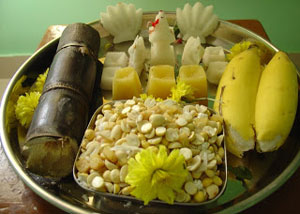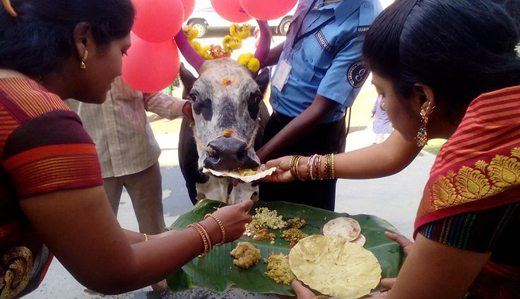’Makara Sankranti’ festivities galore
’Makara Sankranti’ festivities galore
Mangalore Today News Network
 Mangaluru, Jan 14, 2016: The West coast belt is in a celebratory mood due to ’Makara Sankranti’. It is worth to take a look at this annual festival which attaracts a wide cross section of people here. Makara Sankranti is an Indian festival celebrated in almost all parts of the nation in unique and meaningful forms. Basically is a harvest festival.
Mangaluru, Jan 14, 2016: The West coast belt is in a celebratory mood due to ’Makara Sankranti’. It is worth to take a look at this annual festival which attaracts a wide cross section of people here. Makara Sankranti is an Indian festival celebrated in almost all parts of the nation in unique and meaningful forms. Basically is a harvest festival.
Makara Sankranti we are told marks the transition of the Sun into the zodiac sign of Makara (Capricorn) on its celestial path. The day is also believed to mark the arrival of spring in India and is a traditional event. Makara Sankranthi is a solar event making one of the few Indian festivals which fall on the same date in the Gregorian calendar every year: 15 January, with some exceptions. It brings with it the happiness of getting new crops for farmers. It also symbolizes the end of the winter solstice which makes the day last longer than night.
Many in India relate this festival with the Winter Solstice, and believe that the sun ends its southward journey (Sanskrit: Dakshinayana) at the Tropic of Capricorn, and starts moving northward (Sanskrit: Uttarayaana) towards theTropic of Cancer, in the month of Pausha on this day in mid-January. Diverse communities have different names for it : It is Makar Sankranti: In Chhattisgarh, Goa, Odisha, Haryana, Bihar, Jharkhand, Andhra Pradesh,Telangana, Karnataka,Kerala, Madhya Pradesh, Maharashtra, Manipur, Rajasthan, Sikkim, Uttar Pradesh, Uttarakhand, Bihar, and West Bengal. Pongal, Uzhavar Thirunal: Tamil Nadu. Uttarayan: Gujarat. Maghi: Haryana, Himachal Pradesh and Punjab. The day before, people of Punjab celebrate Lohri. Bhogali Bihu: Assam. Shishur Saenkraat: Kashmir Valley. Khichdi: Uttar Pradesh and western Bihar. Makara Sankramana: Karnataka

In Karnataka:
This is the Suggi (ಸುಗ್ಗಿ) or harvest festival for farmers of Karnataka. On this auspicious day, girls wear new clothes to visit near and dear ones with a Sankranti offering in a plate and exchange the same with other families. This ritual is called "Ellu Birodhu." Here the plate would normally contain "Ellu" (white sesame seeds) mixed with fried groundnuts, neatly cut dry coconut and fine cut bella (jaggery). The mixture is called "Ellu-Bella" (ಎಳ್ಳು ಬೆಲ್ಲ). The plate contains shaped sugar candy moulds (Sakkare Acchu, ಸಕ್ಕರೆ ಅಚ್ಚು) with a piece of sugarcane. There is a saying in Kannada "ellu bella thindu olle maathadi" (similar to the saying tilgul kha aani god bola in Maharashtra) that translates to ’eat the mixture of sesame seeds and jaggery and speak only good.’ This festival signifies the harvest of the season, since sugarcane is predominant in these parts. Ellu Bella, Ellu Unde, bananas, sugarcane, red berries, haldi and kumkum and small gift items useful in everyday lives are often exchanged among women similar to the tradition in Maharashtra.
In some parts of Karnataka, a newly married woman is required to give away bananas for five years to married women (muthaidhe/sumangali) from the first year of her marriage and increase the number of bananas in multiples of five. There is also a tradition of some households giving away red berries "Yalchi Kai" with the above. In north Karnataka, kite flying with community members is a tradition. Drawing rangoli in groups is another popular event among women during Sankranti.
An important ritual is display of cows and bulls in colourful costumes in an open field. Cows are decorated for the occasion and taken on a procession. They are also made to cross a fire. This ritual is common in rural Karnataka and is called "Kichchu Haayisuvudu."
Kerala: Makara Sankranti is celebrated in Kerala at Sabarimala where the Makara Jyothi is visible followed by the Makaravilakku celebrations.
- Need For ‘Students, Alcohol and Drugs’ survey
- New Synthetic Drugs Trapping Youth
- Mood Modifying Chips - Future of Drug Use
- Ramping up Indo-Bangla border security
- IITM- A premier educational Institution in a forest. What can we learn?
- Former PM, Manmohan Singh: Notable laws passed under his tenure
- Hashish on Ratnagiri Seashore
- The Poor cry out to Us: Do we respond?
- Clandestine Meth Labs Sprouting Across India
- Hydro ganja from Bangkok latest craze among youth in India
- "Memories to Treasure" Dr.Michael Lobo’s new book
- Dominance of Private Universities: Will it make education inaccessible to underprivileged students?
- Monti Phest: A rich heritage of South Canara
- Kashmir Bhavan in Bengaluru: A must visit place
- "MAI and I" Book of Angelic Emotions
- Draupadi Murmu - The New ’President of India’
- Anthony Ashram in the city grows a classic museum
- First College of Fisheries in India - A Golden Jubilarian
- Flushing Meadows - A Vintage Mansion
- The Colonel’s Bequest
- A Mangalorean PM and his RBI Governor Brother: The Extraordinary story of the Benegal Brothers
- There is no higher religion than Truth: Theosophical Society
- L’affaire - Ashu & Yiju of Mangalore
- Mangalore in Kowloon
- 1568 to 2018 AD: 450 years of Christianity in Mangaluru
- Vice President elect Naidu moves on from nadir to zenith, the phenomenal journey
- Embracing the Outdoors: How Heated Jackets Are Revolutionizing Cold Weather Activities
- Efficient and Sustainable Packaging Solutions with FIBCs
- The Hybrid Kilt Revolution | Where Tradition Gets Trendy
- Affordable Elegance | Embrace Style on a Budget with Cheap Kilts
- Unleashing Style and Functionality | Exploring Tactical Kilts
- Mangalore’s Heroic Lady marks 105th Birthday
- Santa the Christmas spirit
- Geriatric care: Mangalore strikes a fine balance
- The Don Who Made Two Empires to Clash
- CHITRAPUR SARASWATS - A Great Kanara Community
- Our new President Ram Nath Kovind’s significant journey to Rashtrapathi Bhavan
- Marriages made in heaven, big fat weddings made in India
- Eid insight - The giver of glad tidings
- CITY INFORMATION
- TRAVEL
- TOURIST INFORMATION
- HEALTH CARE
- MISCELLANEOUS




 Write Comment
Write Comment E-Mail To a Friend
E-Mail To a Friend Facebook
Facebook Twitter
Twitter  Print
Print 


